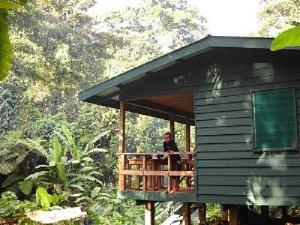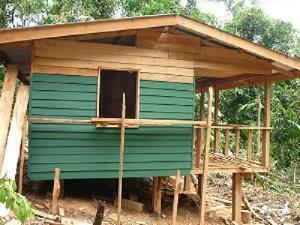Wilko Bosma
Aim of the project is to conserve some of the last intact forest ecosystems in the Western Solomon Islands, while contributing to the sustainable development of the local communities owning these areas.

Barekasi Eco-lodge finalized.
The Solomon Islands is an area of amazing landscapes and rich biodiversity. Especially the unique but vulnerable forest ecosystems are highly at risk due to ongoing destructive logging activities and new threats from mining prospection. The project aims to establish a network of five forest conservation areas that are managed by the landowning communities and legally protected under the new protected area act 2010. The areas are to preserve the unique forest eco-systems of the Solomon Islands and at the same time create employment and income benefits for the local communities. Combining conservation efforts with income generating activities such as low impact tourism, research facilitation and REDD+ initiatives seems a very potential strategy.

Barekasi Eco-lodge being built.
The project is implemented and administered by the Natural Resources Development Foundation (NRDF). NRDF is a local NGO established in 2003 addressing the problem of the ongoing exploitation of forest resources by foreign logging companies. For more than 7 years the organization supports and promotes sustainable forest management by landowners through practical intervention such as sustainable sawmilling, forest rehabilitation and forest conservation. The project under the Rufford Small Grant Foundation is especially to develop and strengthen NRDF’s forest conservation activities. In time NRDF aims to extend its conservation efforts to other areas as well and create a larger network of areas.
Besides RSGF NRDF will also collaborate with international conservation organizations such as World Wide Fund for Nature (WWF) and the Nature Conservancy to make this project successful. The landowners will play the most crucial part in the project activities. Their commitment is most essential and therefore the project puts much emphasis on awareness building, training and establishing income generating activities for local community members. The project is set to take place over the coming 4 years. In the first stage (year) much of the ground work will be carried out such as area mapping, field surveys, biodiversity assessments, drafting management plans for each area and training and awareness building. After this, more specific programmes in each of the conservation areas are planned.